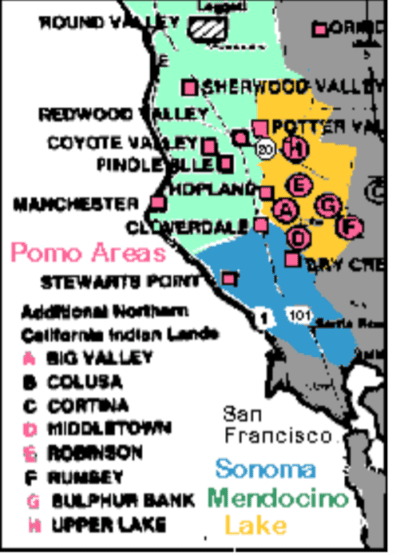The Russian River watershed lies on the unceded territory of Pomo, Miwok, and Wappo Native Americans. The Pomo Landback movement aims to make reparations to existing culture through the co-management of lands by local tribes. Russian Riverkeeper supports efforts to return land management to tribes who could apply thousands of years of Traditional Ecological Knowledge to support the regeneration of the land and water as a result.
 The Russian River watershed located in Mendocino and Sonoma County is stewarded by tribes, especially of Pomo descent. For over 10,000 years, Pomo tribes have lived in harmony with the land, taking only what is necessary while giving back what was taken. Today they lead the way in rejecting harm through building awareness and action.
The Russian River watershed located in Mendocino and Sonoma County is stewarded by tribes, especially of Pomo descent. For over 10,000 years, Pomo tribes have lived in harmony with the land, taking only what is necessary while giving back what was taken. Today they lead the way in rejecting harm through building awareness and action.
The recently returned Kashia Coastal Reserve provides an example of tribal co-management. What once was private land, is now under direct stewardship and management by the Kashia Pomo tribe. Access is provided to the public through the California Coastal Trail. Education on the history and proper stewardship of the land is directed by the Kashia Pomo Tribe and is protected against further misuse.
Another initiative gaining traction for the Pomo Landback movement can be seen in Jackson Demonstration State Forest. The Coyote Valley Tribe (centrally located in Ukiah in the Russian River watershed) is urging the public to help stop the destruction. Harmful logging practices add sediment to creeks and is harmful to fish and other wildlife. Through tribal co-management, we can ensure lands are protected and managed appropriately so ecosystems can continue to sustain life. You can help the Coyote Valley Pomo tribe by staying informed and advocating for efforts like these that seek Pomo authority in the management of lands and waters within their ancestral territory.
We see a similar situation in the Russian River watershed where devastating fire salvage timber harvest from Walbridge has severely threatened Coho Salmon. Land and water are critical for tribes’ physical and cultural survival. The Pomo Landback movement aims to protect the environment and clean water threatened by timber harvest plans and improper land management practices. Governor Gavin Newsom’s Wildfire and Forest Resilience Taskforce is recognizing cultural burning practices as a preventative solution to fires like these. Their strategic plan for expanding the use of beneficial fire relies on help from Native Americans to reintroduce the cultural practice of prescribed burns which are purposely set at low intensity to remove wildfire fuels like debris and undergrowth before uncontrolled fires and subsequent logging destroy critical habitat.
Traditional Ecological Knowledge is a key factor that will help us mitigate the effects of climate change. By living with the land we can begin to reverse these consequences and avoid the emerging crisis that affects us all. Humans are a part of nature and cannot be separated from it. It all depends on our actions moving forward and where we decide to focus our attention going forward.
